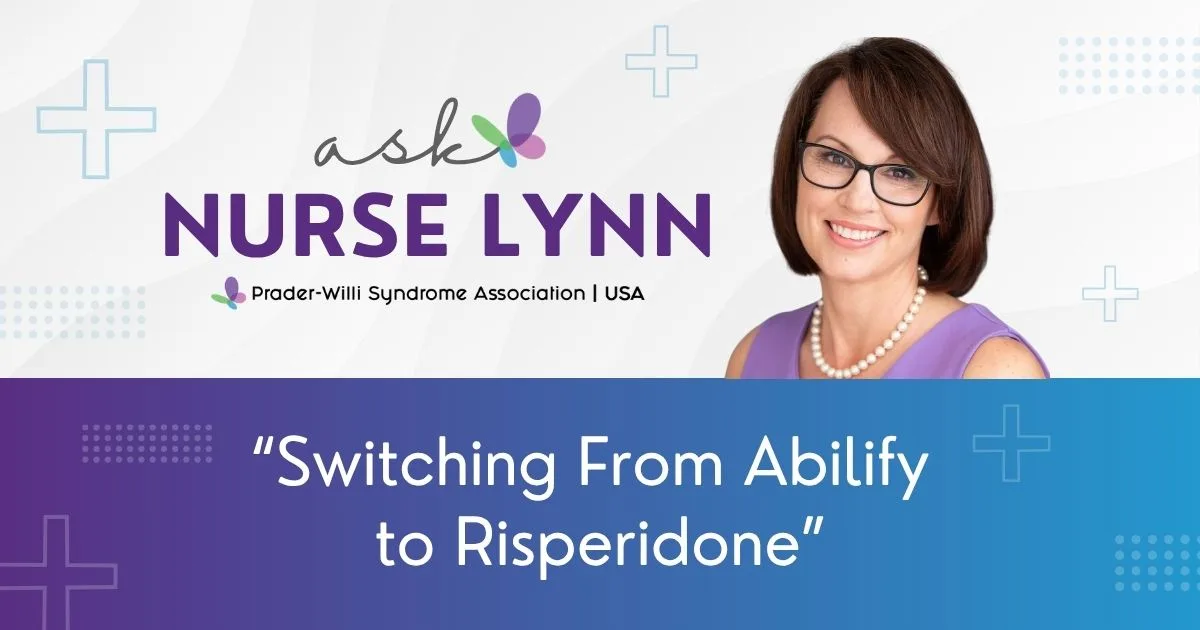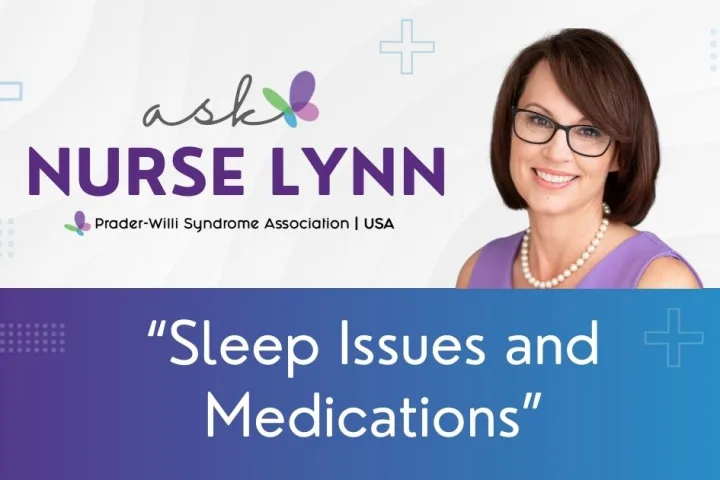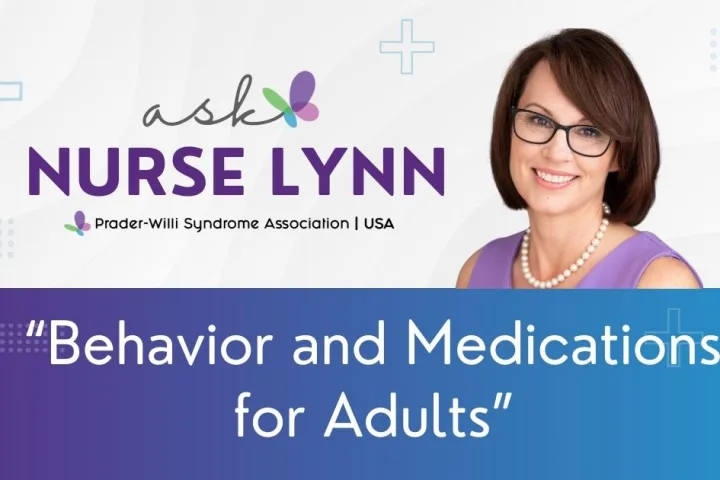Question:
Male, 17 years old, unknown subtype
What are your thoughts on Risperidone? My son has been on Abilify for over 3 years but is now starting to become more agitated as time goes on. The Doctor is suggesting Risperidone to help his extreme impulsive outburst about very small things that he is dealing with. We are doing all of the behavior charts, behavior therapy, teaching coping strategies, etc., but he cannot in the moment of upset use the tools to help.
Nurse Lynn’s Response:
You’ve already done many of the right things—behavior charts, therapy, and teaching coping skills. But sometimes, the brain chemistry in PWS makes it hard for a person to use those coping tools in the heat of the moment.
Both Abilify and Risperidone are called atypical antipsychotics. They help balance chemicals in the brain—mainly dopamine and serotonin—that control mood, focus, and reactions.
Risperidone blocks extra dopamine activity that can cause irritability or impulsive behavior. This can help reduce outbursts, aggression, or repetitive thinking. A switch from Abilify to Risperidone is a common next step when impulsive outbursts worsen despite strong behavioral support.
Sometimes people with PWS do well on Abilify for a while, but as their brains mature or stress changes, it may lose its effect. Switching to Risperidone can bring a sense of calm and make emotions easier to manage. All medicines can have side effects, so use the rule “Start low and go slow.”
Medicine can help your son’s brain stay calm enough to use the tools you’ve already taught him. But it works best when combined with:
- -A predictable daily routine (helps reduce anxiety about surprises)
- -Clear rules and calm responses
- -Plenty of sleep
- -Regular activity and attention to diet
- -Strong relationships with family and caregivers
Dr. Forster reminds us that there’s no single drug for PWS, but there are safe, careful ways to use medicine to target the right symptoms. Every person’s brain chemistry is unique, so the key is patience and teamwork—between your family, doctor, therapist, and school team.
We do offer a peer-peer service that connects our physician experts to your physician to answer questions and provide guidance.
Do you have a non-emergency medical question for Nurse Lynn? Submit your question here:
Share this!





 Perry A. Zirkel has written more than 1,500 publications on various aspects of school law, with an emphasis on legal issues in special education. He writes a regular column for NAESP’s Principal magazine and NASP’s Communiqué newsletter, and he did so previously for Phi Delta Kappan and Teaching Exceptional Children.
Perry A. Zirkel has written more than 1,500 publications on various aspects of school law, with an emphasis on legal issues in special education. He writes a regular column for NAESP’s Principal magazine and NASP’s Communiqué newsletter, and he did so previously for Phi Delta Kappan and Teaching Exceptional Children. Jennifer Bolander has been serving as a Special Education Specialist for PWSA (USA) since October of 2015. She is a graduate of John Carroll University and lives in Ohio with her husband Brad and daughters Kate (17), and Sophia (13) who was born with PWS.
Jennifer Bolander has been serving as a Special Education Specialist for PWSA (USA) since October of 2015. She is a graduate of John Carroll University and lives in Ohio with her husband Brad and daughters Kate (17), and Sophia (13) who was born with PWS. Dr. Amy McTighe is the PWS Program Manager and Inpatient Teacher at the Center for Prader-Willi Syndrome at the Children’s Institute of Pittsburgh. She graduated from Duquesne University receiving her Bachelor’s and Master’s degree in Education with a focus on elementary education, special education, and language arts.
Dr. Amy McTighe is the PWS Program Manager and Inpatient Teacher at the Center for Prader-Willi Syndrome at the Children’s Institute of Pittsburgh. She graduated from Duquesne University receiving her Bachelor’s and Master’s degree in Education with a focus on elementary education, special education, and language arts. Evan has worked with the Prader-Willi Syndrome Association (USA) since 2007 primarily as a Crisis Intervention and Family Support Counselor. Evans works with parents and schools to foster strong collaborative relationships and appropriate educational environments for students with PWS.
Evan has worked with the Prader-Willi Syndrome Association (USA) since 2007 primarily as a Crisis Intervention and Family Support Counselor. Evans works with parents and schools to foster strong collaborative relationships and appropriate educational environments for students with PWS. Staci Zimmerman works for Prader-Willi Syndrome Association of Colorado as an Individualized Education Program (IEP) consultant. Staci collaborates with the PWS multi-disciplinary clinic at the Children’s Hospital in Denver supporting families and school districts around the United States with their child’s Individual Educational Plan.
Staci Zimmerman works for Prader-Willi Syndrome Association of Colorado as an Individualized Education Program (IEP) consultant. Staci collaborates with the PWS multi-disciplinary clinic at the Children’s Hospital in Denver supporting families and school districts around the United States with their child’s Individual Educational Plan. Founded in 2001, SDLC is a non-profit legal services organization dedicated to protecting and advancing the legal rights of people with disabilities throughout the South. It partners with the Southern Poverty Law Center, Protection and Advocacy (P&A) programs, Legal Services Corporations (LSC) and disability organizations on major, systemic disability rights issues involving the Individuals with Disabilities Education Act (IDEA), Americans with Disabilities Act (ADA), and the federal Medicaid Act. Recently in November 2014, Jim retired.
Founded in 2001, SDLC is a non-profit legal services organization dedicated to protecting and advancing the legal rights of people with disabilities throughout the South. It partners with the Southern Poverty Law Center, Protection and Advocacy (P&A) programs, Legal Services Corporations (LSC) and disability organizations on major, systemic disability rights issues involving the Individuals with Disabilities Education Act (IDEA), Americans with Disabilities Act (ADA), and the federal Medicaid Act. Recently in November 2014, Jim retired.